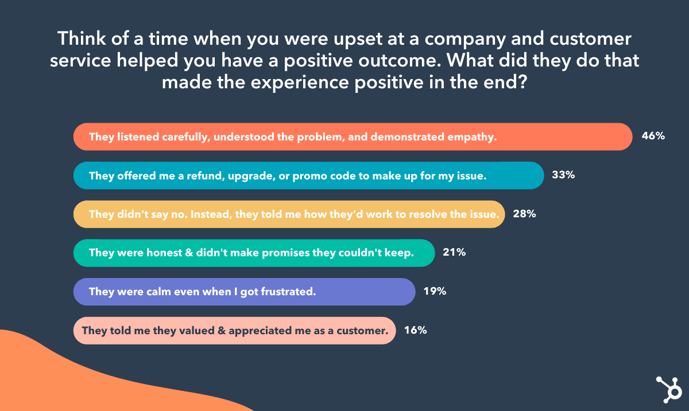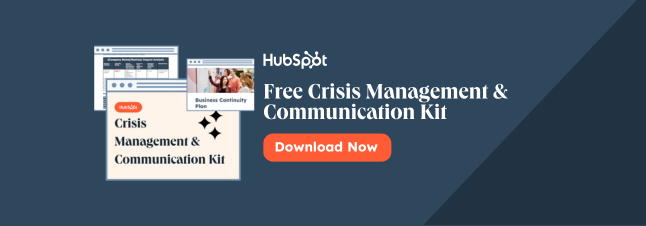Attestation De Sortie Plus De 10km
No thing what your business organisation, your customers are your greatest asset. Which is why keeping them happy is critical. It's natural for your customers to become frustrated or upset from time-to-time when dealing with an result related to your business organization — merely how your customer service team handles and de-escalates the state of affairs is vital for customer retention and loyalty. With the long-term satisfaction of your customers' at stake, it'due south essential that your team learn effective de-escalation techniques. In this post, we'll dive into five de-escalation techniques, and why they work. De-escalation is a process past which you at-home the situation earlier it gets worse. This tin can be done through a multifariousness of techniques involving breathing, agile listening, request questions, being compassionate, and the use of torso linguistic communication. Recently, I had an upsetting experience with an airline after dealing with a flight cancellation. I wanted a refund, then I waited 3 hours to speak with a fellow member of their service team, only to hear: "I'm deplorable, ma'am, but there's nothing I can practice for you." Now, I'm non blaming this airline, or this service rep. But 1 thing I learned throughout the encounter was how much empathy mattered to me. I didn't necessarily need the rep to requite me exactly what I wanted: I but needed to feel heard and understood. And, apparently, so does everyone else. In a recent survey I conducted to 100 consumers across the U.S., "listening carefully, understanding the problem, and demonstrating empathy" was the almost popular response to the question, "Think of a fourth dimension when you were upset at a company and customer service helped you lot have a positive event. What did they do to make the experience positive?" Listening and demonstrating empathy exceeded fifty-fifty "they offered me a refund, upgrade, or promo code". In other words: People care more than about a service rep's behaviors than they exercise a rep's actions. All of which is to say: The way your reps behave when a client is upset could make-or-break that customers' loyalty. And so information technology's a critical component of long-term client retention. Let's dive into five of the most effective de-escalation techniques, next. 46% of respondents rated active listening and empathy as the most important de-escalation technique good past service reps. Improving your communication will help prevent misunderstandings from occurring, and will help you lot to de-escalate them when they do. Active listening requires y'all to actually listen to the other person, rather than interrupting them, rushing them, or spending the time in your caput plotting out what y'all'll say adjacent. When you lot mind to the other person, they experience heard and appreciated, and their anger volition brainstorm to subside. Asking questions (and listening to the answers!) allows you to hear their side of the story and get down to the actual root of the problem. Think that there are always iii sides to a story: yours, theirs, and what really happened. Exist open to hearing how they have interpreted something and how it may be unlike than how you intended information technology. As HubSpot Senior Inbound Consultant Bradlee McKibben told me, "When I encounter escalation situations during consulting calls, the first thing I do is lay a strong foundation of listening, past manner of asking strategic questions and giving the customer the space to air their frustrations and their needs. My goal is to dig deeper into what the bodily root trouble is, every bit sometimes frustrations can be misaligned. Everyone encounters roadblocks and challenges; customers simply desire to know we understand the why and are here to aid." Showing empathy by putting yourself in their shoes volition help de-escalate the situation at-hand. Once they know you're going to try and do what's all-time for them, they tin calm downwardly and you lot ii tin can piece of work together to become their upshot resolved. Money can ofttimes be a major cause of contention. If your customers feel they've lost or wasted money and haven't received the full parcel in-return, it makes sense for them to feel frustrated or angry. Oftentimes, then, money tin can as well exist the answer. In fact, roughly one-third of respondents marked this equally the de-escalation technique that led to a positive client service feel. While it can feel painful to offering anything for 'complimentary' to a customer, you'll want to go on in mind that it'southward much more expensive to acquire a new customer than keep an existing one. Of course, you'll want to abide past your visitor'south refund policies whenever possible, just speak to your manager to understand what you can offer an unhappy customer if yous're unable to resolve their consequence. In the situation with the airline, I felt much ameliorate about purchasing another ticket from them once a service rep had offered me a refund on my cancelled flight. Information technology proved they valued my future business organization more their bottom-line, and increased my trust. If y'all can't provide a refund, consider offering a promotion or discount on a hereafter purchase. In that location'southward nothing more frustrating than hearing "No," "I don't know", "I cannot", or "Information technology is not inside my ability" from a customer service rep — so, to truly de-escalate an issue, avert these terms. Instead, you might say phrases similar, "I will investigate this event," "I will effort to resolve this consequence", or "I'chiliad digging into this." If possible, explain specifically how you're planning to aid resolve the customer's issue. For instance, you might explain that y'all're going to ship their ticket to your IT squad so they can dig into an issue with your software. Tell them they can expect a follow-up from you lot within the next 48-hours, and you'll intermission payments in the concurrently until the issue is resolved. As McKibben puts it, "Sometimes I encounter escalation situations that are outside my role'south scope. I brand sure to clearly explain to the customer how my expertise isn't best suited to solve the problem, just that I will take the following steps: loop in the right bespeak of contact, file a roadblock with our product squad, and/or follow up with the Support rep who is handling the ticket." She adds, "I make sure my follow-up is timely, actionable, and detailed so that the client knows I'm keeping track of the consequence. Lastly, I will provide helpful resources or means other customers have tackled similar issues, if applicable." HubSpot's Senior Customer Success Manager Jen Berenguer told me honesty is her number one de-escalation technique. She says, "Firstly, because it aligns with HubSpot's value of transparency, but mainly because managing expectations is ane of the most important aspects of my function. When I'1000 honest with how much I care about a customer's problem, the steps I'one thousand taking to help, and more importantly what I won't be able to do, it helps them understand the complexity of the matter, and how feasible it is to go to their desired outcome." "Most of the times, honesty leads to a stronger relationship with my clients, even when we have a problem that can't be solved." Lying to your customers to make them happy might seem similar an easy solution for de-escalating a situation, but it volition ultimately backfire by creating a major sense of distrust. Personally, I wouldn't want to work with a business that encouraged or enabled its back up reps to prevarication at all costs — would y'all? Rather than lying or over-promising when y'all're unsure whether you'll be able to deliver, simply ask for time to explore the issue further. Instead of maxim, "I can promise you we can aid you lot," yous might say something like, "I tin can promise you lot I'll effort my best to help you lot." Customers know when you're lying, and promising you tin help is a lie unless you've already found a surefire solution. While it tin can be tempting to raise your voice or become equally emotional when speaking to an angry customer, it won't de-escalate the issue and might even make information technology much worse. Instead, it'due south critical you remain calm. Breathing can assistance with this — When an argument begins, our bodies are forced into a fight, flight, or freeze mode. Our animate becomes labored, our heart rate increases, and we're literally fix to fight our "attacker" or flee the situation. Neither of these solutions is ideal for workplace disharmonize. Controlled breathing benefits a heated state of affairs in multiple means. Commencement, taking a deep breath calms your nervous organisation, allowing y'all to recollect (and respond) clearly and calmly. With focused breathing, you can lower your heart charge per unit and your claret pressure level, and have yourself out of this common stress response. Second, a few moments of deep animate tin can give y'all the fourth dimension you need to collect your thoughts so you don't say or practise anything that could cause lasting damage. While only sixteen% of respondents rated this as of import for de-escalation, information technology'southward undoubtedly a nice extra step you can take once you've de-escalated a state of affairs. However, you lot'll want to time this i wisely: Telling your client you value them before providing a solution to their problem could seem disingenuous, especially if they're upset. One time you lot've identified a solution, nonetheless, it's a good idea to emphasize that you lot truly appreciate the customer'southward business organisation. Learning de-escalation techniques and training your entire team from HR, to managers, to your frontline workers can have a multitude of benefits for your arrangement. These include (just are not limited to): Whenever yous have different personalities coming together to complete a mutual goal, misunderstandings are bound to happen. With the right de-escalation preparation, you can ensure that when minor issues ascend, they don't turn into major battles that ruin relationships and damage your bottom line. 

What are de-escalation techniques?
Why De-Escalation Matters in Customer Service
How Consumers React to five De-Escalation Techniques + Why They Work [New Data]

1. Do active listening, and demonstrate empathy.
2. Offer refunds, upgrades, or promos to make upwards for an outcome.

three. Don't say no; instead, tell your customer how you'll work to resolve their upshot.
4. Be honest and don't brand promises y'all can't keep.
v. Stay calm, even when your customer is frustrated.
6. Tell customers you value and appreciate them.
The Benefits of De-Escalation in a Visitor

Attestation De Sortie Plus De 10km,
Source: https://blog.hubspot.com/service/de-escalation-techniques
Posted by: harrellgare1973.blogspot.com


0 Response to "Attestation De Sortie Plus De 10km"
Post a Comment